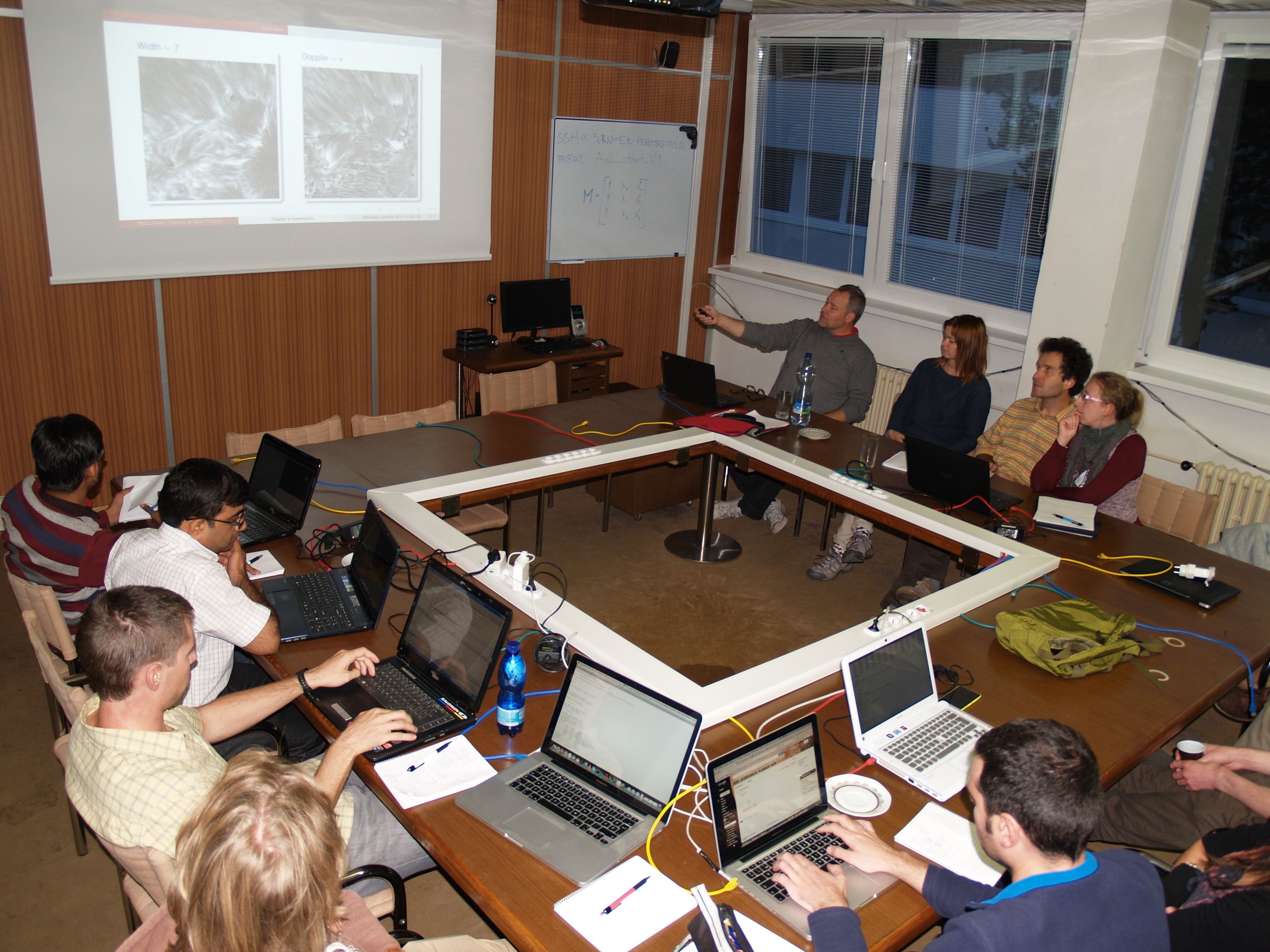Oct. 12, 2014. 2nd SOLARNET School and Workshop, and 2nd SPRING Meeting (Tatranska Lomnica, Slovakia).
- Details
- Published on Sunday, 12 October 2014 10:51

SOLARNET Project prioritizes the collaborations between the new generation of scientists and experienced researchers through short stays and training actions to acquire competences in relevant fields of Solar Physics.
12 students from Europe, Russia and India are participating in the 2nd School "Ground- and space-based instruments” organized by the SOLARNET colleagues from Slovakia. students are are intensively taught by experienced lecturers in Solar Physic:
Dr. F. Zuccarello (INAF, Italy) introduced the SOLARNET project and the design of the 4m class European Solar Telescope (EST); Dr. Th. Rimmele (NSO, USA) described the current stage of construction of the biggest ground based facility for Solar Physics, the DKIST 4m telescope; Dr. M. Löfdah (RSAS, Sweden) trained the students how to use and reduct the data from 1m Swedish Solar Telescope; Dr. D. Williams (UCL-MSSL, UK) gave lectures concerning the space instruments and data handling; Dr. T. Pereira (UiO, Norway) described IRIS instrument and has gone with the students through the whole process of how to download and how to deal with IRIS data; and Drs. A. Kucera, J. Koza and M. Kozak (all three from AISAS, Slovakia) gave lectures on complementary skills and conducted hand on sessions.
Practical part (exercises) of the School is also important for students to try really work with databases, real data and sophisticated software commonly used in Solar Physics. Second part of the School will be a participation at the Workshop "Methods in high resolution and synoptic Solar Physics”, and at the 2nd SPRING* Meeting, October 12-16, 2014, also in Tatranska Lomnica, Slovakia.
More details at SOLARNET 2nd School
SOLARNET 2nd Workshop and 2nd SPRING Meeting
* Solar Physics Research Integrated Network Group (SPRING)
Aug. 25, 2014. SOLARNET Announcement of Opportunity. Mobility Programme of Young Researchers. Deadline: September 15, 2014.
- Details
- Published on Monday, 25 August 2014 08:26
The SOLARNET Mobility of Young Researchers Programme is pleased to inform all solar Physics community that the IV Call for Proposal is officially open.
All proposals received prior to September 15th will be considered by the Mobility Evaluation Committee for the period January 1st - June 30th 2015.
The Mobility Evaluation Committee will evaluate all submitted applications, and will select two of them for supporting travel, accommodation and subsistence costs.
The selection of the granted proposals will be announced on September 30th.
More details at http://solarnet-east.eu/networking-activities/mobility.
July 31, 2014. 2nd SOLARNET Meeting (Palermo, Italy, 2-5 February 2015).
- Details
- Published on Thursday, 31 July 2014 14:53
"Solar and stellar magnetic activity"
The SOLARNET Project is pleased to announce the second SOLARNET Meeting that will be held in Palermo, Italy in early February 2015. The goal of this meeting is to foster collaborations between ground and space solar projects, in order to:
- provide a forum to discuss the use of current and future observational solar facilities, and how to optimise their scientific returns;
- identify the potentially paradigm-shifting observations that will become possible with the next generation ground - and space-based solar telescopes and their advanced instrumentation;
- foster collaborations between researchers working at the development of ground - and space-based projects and creation of synergies between research programs at different wavelength bands.
More details at 2nd SOLARNET Meeting.
July 24, 2014. 1st SOLARNET Technology Transfer Workshop (San Sebastián, Spain, October 2, 2014).
- Details
- Published on Thursday, 24 July 2014 15:22
"Synergies between Solar Astrophysics and Nuclear Fusion"
Date: Thursday 2nd October 2014 (09:00 – 18:00).
Location: Symposium on Fusion Technology - SOFT 2014 Conference, Kursaal Congress
Center, San Sebastian, Spain.
The SOLARNET consortium is pleased to announce a one day workshop on 2nd October 2014 with the aim of bringing together people from the solar astrophysics and nuclear fusion sectors in an ‘open innovation’ environment to brainstorm on possible technologies, tools, and skills from the nuclear sector that could be transferred to the solar astrophysics sector, and to assess technologies proposed by the solar astrophysics community for potential transfer into the fusion sector.
More details at 1st SOLARNET Technology Transfer Workshop.
More Articles...
- June 26, 2014. More than 2.500 people visited the Teide Observatory in the Open Doors Days.
- June 19, 2014: 2nd SOLARNET School, Workshop and SPRING Meeting (Tatranska Lomnica, Slovakia, October 5-16, 2014).
- June 17, 2014. Teide Observatory Open Doors Days: 20th and 21st June, 2014.
- June 5, 2014. SolarLab: 38 500 students and 140 schoolteachers participated in the first year of the project.



